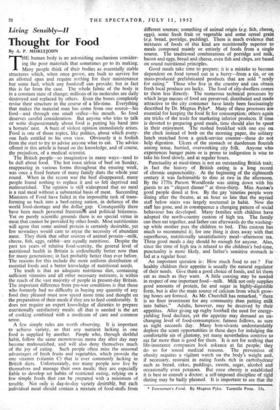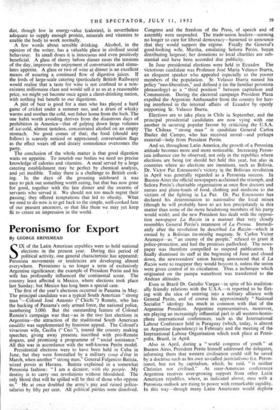Living Sensibly—II
Thought for Food
By A. P. MEIKLEJOHN
THE human body is, an astonishing mechanism consider- ing the poor materials that sometimes go to its making. Many people think of their bodies as essentially stable structures which, when once grown, are built to survive for an allotted span and require nothing for their maintenance but some fuel, which any foodstuff can provide; but in fact this is far from the case. The whole fabric of the body is in a constant state of change; millions of its molecules are daily destroyed and replaced by others. Even the bones completely revise their structure in the course of a life-time. Everything that makes the material man has come from one source—his food—and through one small orifice—his mouth. So food deserves careful consideration. But anyone who tries to talk or write dispassionately about food is putting his hand into a hornets' nest. A buzz of violent Opinion immediately arises. Food is one of those topics, like politics, about which every- one feels entitled to his own view. Obviously it is foolish from the start to try to advise anyone what to eat. The advice . offered in this article is based on the knowledge, and of course, the prejudices, of a medical scientist.
The British people—so imaginative in many ways—tend to be dull about food. The hot roast sirloin of beef on Sunday, reappearing in various forms throughout the ensuing week, was once a fixed feature of many family diets the whole year round. When in the recent war the beef disappeared, many people found nothing to replace it and so felt deprived and malnourished. The opinion is still widespread that no meal is a real meal without a substantial basis of meat. Succeeding Ministers of Food have failed in the impossible task of trans- forming us back into a beef-eating nation, in defiance of the world food-shortage and the dollar_gap. Consequently there have been much personal frustratiolh and political bitterness. Yet on purely scientific grounds there is no special virtue in meat that cannot be provided by other foods. Most nutritionists will agree that some animal protein is certainly desirable, yet few nowadays would care to argue the necessity of abundant meat. They think that other sources of animal protein—milk, cheese, fish, eggs, rabbit—are equally nutritious. Despite the past ten years of relative food-scarcity, the general level of nutritional health in Britain is undoubtedly better now than for many generations; in fact probably better than ever before. The reasons for this include the more uniform distribution of, essential foods and a better knowledge of nutritional needs.
The truth is that an adequate nutritious diet, containing sufficient vitamins and all other necessary nutrients, is within the reach of the vast majority of people in present-day Britain. The important difference from pre-war conditions is that those who formerly had no difficulty in buying any quantity of any food they pleased must now spend more time and thought on the preparation of their meals if they are to feed comfortably. It does not require an expert knowledge of dietetics to prepare nutritionally satisfactory meals; all that is needed is the art of cooking combined with a modicum of care and common sense.
A few simple rules are worth observing. It is important to achieve variety, so that any nutrient lacking in one food is supplied by another. People who, through slothful habit, follow the same monotonous menu day after day may become malnourished, and will also deny themselves much of the joy of eating. Such people often miss the seasonal advantages of fresh fruits and vegetables, which provide the one vitamin (vitamin C) that is- ever commonly lacking in British diets. Unfortunately, too many people now live by themselves and manage their own meals; they are especially liable to develop set habits of restricted eating, relying on a few simple foods that can be prepared with a minimum of trouble. Not only is day-to-day variety desirable, but each individual meal should contain a mixture of food-stuffs from different sources; something of animal origin (e.g. fish, cheeset eggs), some fresh fruit or vegetable and some cereal gram (e.g. bread, porridge, pudding). There is much evidence that mixtures of foods of this kind are nutritionally superior to meals composed mainly or entirely of foods from a single source. The traditional combinations of porridge and milk, bacon and eggs, bread and cheese, even fish and chips, are based on sound nutritional principles.
Good meals take time to prepare; it is a mistake to become dependent on food turned out in a hurry—from a tin, or on mass-produced prefabricated products that are sold " ready for eating." Those who live in the country and can obtain fresh local produce are lucky. The food of city-dwellers comes to them less "directly. The 'numerous technical processes by which large masses of food are preserved, distributed and made attractive to the city consumer have lately been fascinatingly described by Dr. Magnus Pyke*. Many of these processes are essential for keeping the food fit for consumption; others again are tricks of the trade for marketing inferior products. If time is devoted to preparing good meals, time should also be spent in their enjoyment. 'The rushed breakfast with one eye on the clock instead of both on the morning paper, the solitary lunch snatched from a quick-service counter—these do not help digestion. Ulcers of the stomach or duodenum flourish among tense, hurried, overworking city folk. Anyone who experiences hunger pains or is prone to indigestion is wise to take his food slowly, and at regular hours.
Punctuality at meal-times is not an outstanding British trait; in fact the history of British eating is a long record of chronic unpunctuality. At the beginning of the eighteenth century it was fashionable to dine at two in the afternoon. By the 1770s Parson Woodforde was sitting down with his guests to an " elegant dinner " at three-thirty. Miss Austen's good people dined at five. By the gay 'nineties people were dining after the theatre, at an hour so late that the myriad staff below stairs was largely nocturnal in habit. Now the staff has gone, and in consequence a changing pattern of social behaviour has developed. Many families with children have adopted the north-country custom of high tea. The family can then eat together, and father can afterwards do the washing- up while mother puts the children to bed. This custom has much to recommend it; for one thing it does away 'with that superfluous, nutritionally unsatisfactory meal—afternoon tea. Three good meals a day should be enough for anyone. Also, since the time of high tea is related to the children's bed-time, punctuality is more likely, and father's sensitive stomach is '- fed at a regular hour. An important question is : How much rood to eat ? For healthy children their appetite is usually the natural regulator of their needs. Give them a good choice of foods, and let them. eat as much as they want. A little coaxing may be needed in respect of one important food—milk. Milk not only supplies good amounts of protein, fat and sugar in highly-digestible form, but is also the main source of calcium from which grow- ing bones are formed. As Mr. Churchill has remarked, " there is no finer investment for any community than putting milk into babies." Adults, however, may be deceived by their appetites. After giving up rugby football the need for energy- yielding food declines, yet the appetite may demand an un- changing level of food-consumption; fatness follotvs, as sure as night succeeds day. Many bon-vivants understandably deplore the scant opportunities in these days for indulging the comfortable sin of gluttony, yet many nevertheless contrive to eat far more than is good 'for them. It is not for nothing that life-insurance companies look askance at fat people; they do so for sound medical reasons. The prevention of obesity requires a vigilant watch on the body's weight and, if necessary, restraint in eating foods rich in carbohydrate' such as bread, cakes, puddings, sweets, sugar, alcohol and occasionally even potatoes. But once obesity is established it is best to consult a doctor; a self-imposed discipline of rigid dieting may be badly planned. It is important to see that the
* Townsman's Foods By Magnus Pyke. Turnstile Press. 15s.
diet, though low in energy-value (calories), is nevertheless adequate to supply enough protein, minerals and vitamins to enable the body to work normally. A few words about sensible drinking. Alcohol, in the opinion of the writer, has a valuable place in civilised social behaviour. In small doses it is innocuous and even positively beneficial. A glass of sherry before dinner eases the tensions of the day, improves the enjoyment of conversation and stimu- lates appetite. A glass or two of wine at dinner is an excellent means of assuring a,. continued flow of digestive juices. If the lords of large-scale catering (particularly British Railways) would realise that a taste for wine is not confined to a non- existent millionaire class and would sell it to us at a reasonable price, we might yet become once again a claret-drinking nation, with nothing but benefit to our digestions.
A pint of beer is good for a man who has played a hard game of cricket under a summer sun, and a dram of whisky warms and soothes the cold, wetfisher home from the loch. The one habit worth avoiding derives from the disastrous days of prohibition in America—that of gulping down large volumes of ice-cold, almost tasteless, concentrated alcohol on an empty stomach. No good comes of that; the food (should any follow) is scarcely noticed or appreciated; conversation flags as the effect wears off and dreary somnolence overcomes the partY. The conclusion of the whole matter is that good digestion waits on appetite. To nourish our bodies we need no precise knowledge of calories and vitamins. A meal served by a large catering establishment may be perfect by chemical analysis, and yet inedible. Today there is a challenge to British cook- ing. In the days of the groaning sideboard it was easy to pick out something worth eating, but that has now gone for good, together with the late dinner and the swarms of servants who served it. We should not too much regret their passing; they offered temptations that led to obesity. What we need to do now is to get back to the simple, well-cooked fare of our peasant ancestors, so that like them we may yet keep fit to create an impression in the world.








































 Previous page
Previous page